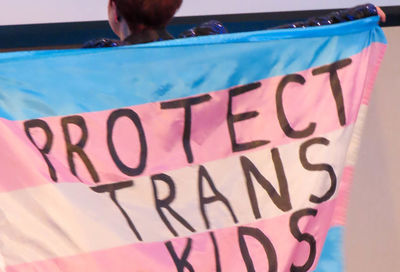‘Toy Boy’ review: Netflix’s sudsy, studly soap opera
A sleuthing male stripper takes it off for justice in Netflix's spicy Spanish soap opera "Toy Boy"

As a sudsy, studly diversion from serious disruption, Spanish soap Toy Boy (★★★☆☆) fits the brief of breezy binging material quite nicely. Set in the primetime paradise of Marbella, a jewel bathed by the sea on the Andalusian coast, the Netflix show feels like a world unto itself, “here just to set you free,” as the theme song teases. That lyric might also be the battle cry of the Toy Boy revue, a buff lineup of male exotic dancers who keep the ladies screaming and tipping at a club called Inferno, the main backdrop for season one’s thirteen episodes of sex, murder, and escándalo. (Netflix says season two is on the way.)
The Toy Boy team — Hugo (Jesús Mosquera), Iván (José de la Torre), Jairo (Carlo Costanzia), and Germán (Raudel Raúl Martiato) — are thick as thieves, but mostly law-abiding citizens, until Hugo becomes star suspect for a high-profile murder he did not commit. Convicted and sentenced to fifteen years for killing the husband of wealthy and powerful “client” Macarena Medina de Solís (Cristina Castaño), Hugo serves seven years in prison before he’s paroled with the help of an ambitious young attorney, Triana (María Pedraza). Together Hugo and Triana set out to clear his name, as the Toy Boy crew reunites to reignite the fading club Inferno.
Seven years removed from their former glory, the now older if not wiser Toy Boy dancers add a newbie — eager Óscar (Carlos Scholz) — and can still whip their all-female audience into a frenzy. Although, for a Netflix offering, their act simmers more than sizzles. Fans seeking that titillating, thong-powered Magic Mike experience might be disappointed with the lack of nerve (or nudity), despite better than decent choreography by Fidel Buika, and an able cast of movers and shakers. De la Torre, in particular, supplies vibrant energy playing Toy Boy dancer/manager Iván, who otherwise suffers through a tired storyline of owing various thugs money and favors.
As the most prominent Toy Boy, broodingly handsome Mosquera looks and dances the part, while projecting Hugo’s dogged commitment to proving his innocence. As a TV sleuth, however, he doesn’t establish a persuasive style or methodology to truly distinguish him as the next cool Columbo. Hugo wants answers, so he chases them down — there isn’t much method to his pursuit.

But there are unexpected twists and resets (including a few biggies in episode three), most often befalling the murder victim’s wife Macarena, distinguished by Castaño’s luscious performance as the true star of this soapdish. The fiercely stylish, scheming Macarena rules over her family’s money and their construction business, fending off the rival Rojas family and trying to figure out what’s troubling her gay son Andrea (Juanjo Almeida). Unfortunately, despite the series’ mucho gay appeal, the leading queer character is the least appealing of the principals, portrayed as a whimpering brat by one of the show’s weakest actors. To a comical degree, Andrea likes to declare knowledge of some scandalous secret, then exit dramatically, neglecting to reveal what he knows. Yet somehow he attracts the affectionate attentions of Hugo’s Toy Boy teammate Jairo, who happens to be mute and communicates via sign language.
Jairo, far better than stereotypically emo Andrea, represents the show’s compassionate approach to marginalized characters. While these melodramatic plots revolving around boardroom betrayals and Bolivian drug stashes rarely tread, even metaphorically, close to real-world politics, the show makes a point of standing up for the rights of Hugo and his pals to make their money as boy toys if they so choose. Constantly referred to as “a male prostitute from Marbella,” Hugo never hesitates to set the record straight that he’s a stripper, not a prostitute. He wants to be able to dance for a living, and be considered more than a piece of meat.

Of course, the show tries to dangle its meat and eat it too, by gleefully and campily serving up the sexy objectification that it also insists should not define Hugo and his pulchritudinous posse. That’s a fine line to striptease across, and Toy Boy manages, at least in the four episodes reviewed, not to fall on its face. Shot like glistening action figures, the Toy Boys serve a kind of humble humanity that helps ground this fantasy, without shaking up the sense of escapism. Even murder barely intrudes on the sun-soaked aesthetics and Run Lola Run pacing of this glitzy, kitschy adventure to Spain’s Costa del Sol.
Toy Boy is currently available for streaming on Netflix, in Spanish with subtitles or multiple dubbed language options. Visit www.netflix.com.
Support Metro Weekly’s Journalism
These are challenging times for news organizations. And yet it’s crucial we stay active and provide vital resources and information to both our local readers and the world. So won’t you please take a moment and consider supporting Metro Weekly with a membership? For as little as $5 a month, you can help ensure Metro Weekly magazine and MetroWeekly.com remain free, viable resources as we provide the best, most diverse, culturally-resonant LGBTQ coverage in both the D.C. region and around the world. Memberships come with exclusive perks and discounts, your own personal digital delivery of each week’s magazine (and an archive), access to our Member's Lounge when it launches this fall, and exclusive members-only items like Metro Weekly Membership Mugs and Tote Bags! Check out all our membership levels here and please join us today!





















You must be logged in to post a comment.